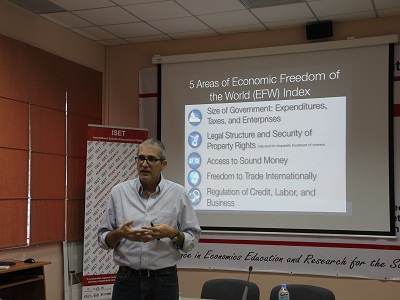- Details
On October 25th, ISET was visited by Dr. Robert A. Lawson of the Fraser Institute. In a highly entertaining and often humorous lecture, Dr. Lawson discussed a wide variety of topics, including the notion of economic freedom, research into economic liberty, as well as Georgian reforms since 2004 and recommendations for future development.
One of the most important aspects of Dr. Lawson’s presentation was the fact that Georgia, as a small country, is highly dependent on international trade for future growth. This is in contrast to the United States: as Dr. Lawson explained in a hypothetical scenario, if the US was to hypothetically abruptly cease all trade with other countries, it would still retain something of an economy, albeit one far reduced in size. This is simply due to the fact that the US has such a large population; small countries such as Georgia, meanwhile, would collapse without foreign trade partners. With this in mind, Dr. Lawson then discussed Georgia’s case specifically and attributed the country’s economic success over the last two decades to successfully deepening ties with other countries.
- Details
On January 29, ISET was pleased to host Prof. Michael Beenstock for a seminar-workshop. Prof. Beenstock is the author of ten books on topics including time series and spatial econometrics, macroeconomics, the global economy and economic development, as well as writing more than 100 refereed journal articles. He presented the preliminary findings of a research project entitled “The Puzzle of Economic Development without Rural-Urban Transition in Georgia.” The project was undertaken by the Shota Rustaveli National Science Foundation and an ISET research team.
“Manchester is known for two things: 1) Manchester United and Manchester City, 2) I was born in Manchester,” said Prof. Beenstock at the very beginning of a presentation. The third point fame for the city, which is more important for Economic Science, is Victoria University of Manchester. Here, Arthur Lewis wrote his seminal work in Development and Growth Economics for which he was awarded the Nobel Memorial Prize in Economics in 1979. Lewis provided a structural theory of economic development which explained the correlation between urbanization and development in the past, and which would also predict it in the future. The Lewis and Harris-Todaro (Harris and Todaro 1970) models have become canons of textbooks on development economics, and rural-urban transition is now regarded as an inevitable and ubiquitous consequence of economic development.












